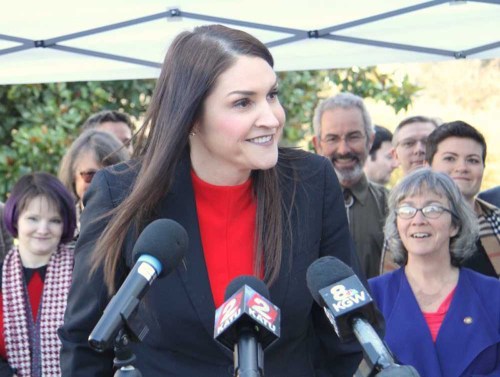Campaign spending ramping up as election nears
Published 8:00 am Wednesday, September 23, 2020

- After winning the secretary of state office in 2022, former Sen. Shemia Fagan, D-Portland, was considered a top candidate for higher office in coming years - including a possible bid for governor in 2030 if Gov. Tina Kotek served two terms. She was also mentioned as a possible candidate for the U.S. Senate or U.S House if veteran Democrats retired. She resigned May 8, 2023, over revelations she was moonlighting as a consultant to a marijuana retailer.
SALEM — A political action committee backing a ballot measure aimed at taxing tobacco products racked up the largest contributions so far for the Nov. 3 election, state records showed Tuesday, Sept. 22.
A $50,000 contribution by Gov. Kate Brown’s political action committee to the Democratic nominee for Secretary of State also attracted attention.
The rules for reporting campaign contributions changed on Sept. 22, with campaigns required to report all fundraising and spending within seven days of the transactions.
Previously, campaigns could wait up to 30 days, though many recorded contributions quicker than the maximum time allowed.
Oregon’s campaign finance rules are among the least restrictive in the United States. Oregon courts have struck down attempts to regulate contributions, citing the expansive “freedom of speech” protections in the state constitution. There are no limits on the amounts that individuals, businesses, labor unions and political action committees can contribute.
Campaign contributions for the U.S. Senate seat held by Democrat Jeff Merkeley, who is seeking reelection, and Oregon’s five congressional districts are different. Those campaigns are regulated by the Federal Elections Commission, which limits individual contributions to $2,800 per election. Many political action committees not officially affiliated with candidates are involved in campaigns, skirting the limits.
For campaigns that fall under Oregon law, the biggest spending through Sept. 14 has been on Measure 108, which would increase cigarette and cigar taxes, create a tax on e-cigarettes and nicotine vaping devices and fund health programs.
Medical and health related companies and organizations backing the ballot measure have sent six-figure contributions to Oregonians for a Smoke Free Tomorrow, a political action committee urging a yes vote.
Many of the biggest contributions to Measure 108 came early in the current election finance cycle. In November and December 2019, Providence Health & Services gave $3.29 million, Legacy Health Systems CPC gave $1.73 million and Peace Health gave $1.05 million to back Measure 108.
Kaiser Permanente, Asante, St. Charles Health System, Salem Health Hospitals & Clinics, Samaritan Health Services, and the Oregon Association of Hospital & Health Systems each contributed more than $500,000. The hospital association also gave $500,000 on Sept. 9 of this year to a second PAC backing the initiative, Yes for a Healthy Future.
Though dwarfed by the ballot measure financing, a notable contribution was $50,000 that Gov. Kate Brown’s political action committee contributed to Shemia Fagan, the Democratic candidate for secretary of state, on Sept. 11. The secretary of state regulates elections and audits government agencies. The next secretary of state could also redraw congressional and legislative districts if the Oregon Legislature cannot agree on a plan in 2021. The new districts go into effect in 2022.
Fagan, a state senator from the Portland area, will try to win back the only statewide office held by a Republican. She entered the May 19 primary at the last minute — on Feb. 29 — after former House Majority Leader Jennifer Williamson, D-Portland, dropped out.
Fueled by large donations from labor unions, Fagan beat Sen. Mark Hass, D-Beaverton, and Jamie McLeod-Skinner of Terrebonne in the May 19 primary.
Fagan has raised just under $1.2 million, but the primary drained her coffers with spending of $962,425 to date. She has just over $241,000 available. Her largest contributors have been unions representing public employees, teachers, and other workers. Planned Parenthood has contributed $25,000.
Sen. Kim Thatcher, of Keizer, easily won the Republican primary. She has raised $345,000 and spent roughly $212,000, according to state campaign finance records. She currently has $153,000 in funds available.
No contribution to Thatcher’s campaign has exceeded $10,000. Contributors include forest products companies and a gun rights group.
Fagan has been endorsed by the Working Families Party, while Thatcher is endorsed by the Independent Party.
Kyle Markley an Intel engineer from Hillsboro, is the Libertarian candidate. Nathalie Paravicini, a naturopathic medicine practitioner from Tigard, is the candidate for both the Pacific Green and Progressive parties.
Treasurer Tobias Read and Attorney General Ellen Rosenblum — both Democrats — are both seeking reelection.
Read has raised $302,993 while spending $176,653. With additional loans, Read has $300,575 available. His three largest contributions came last year from out-of-state law firms: $25,000 from Pomerantz LLP in New York, $20,000 from Grant & Eisenhofer PA in Delaware, and $15,000 fromKessler Topaz Meltzer & Check LLP of Pennsylvania.
Read’s Republican opponent is Jeff Gudman, a Lake Oswego city councilor. He has raised $104,118 and spent $62,672. Including loans, he has $50,264 available. Gudman has no contribution of more than $5,000, with money coming primarily from individuals.
Read has also been endorsed by the Working Families Party. Others on the ballot are retired Keizer maintenance worker Michael P. Marsh of the Constitution Party and Oregon City union truck driver Chris Henry, who has the endorsement of the Independent, Progressive and Pacific Green parties.
In the attorney general’s race, Rosenblum, the Democrat incumbent, has raised $363,646. and spent $310,082. Including loans, she has $170,305 available. Her largest contributions are several payments and in-kind contributions totaling $138,691 from the Democratic Attorney Generals Association. She received $10,000 from Nike Inc. and Affiliates, the Beaverton-based sportswear company. She’s received contributions of $10,000 from the United Food and Commercial Workers Union, and $5,000 from Anheuser-Busch, Amazon, the National Abortion Rights Action League, the PAC of Labor Commissioner Val Hoyle, law firms and labor unions.
Rosenblum is also endorsed by the Independent and Working Families parties.
Self-employed software designer Michael J. Cross is the Republican nominee. He lists addresses in Salem and Bandon. He’s raised $6,511 and spent $4,746.95. He has $1,764 available. Records show no contribution over $500.
Also on the ballot for attorney general are Beaverton technical writer Lars Hedbor of the Libertarian Party.









